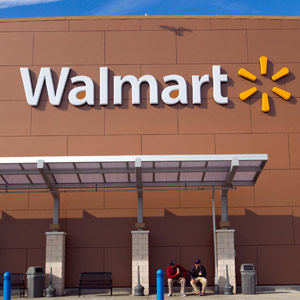Investing News
Wal-Mart holds food drive for its own employees
Bins inside a Cleveland store ask shoppers to donate to 'associates in need.' The company defends the move.
A Cleveland Wal-Mart (WMT -0.04%) store is holding a food drive -- for its own employees.
"Please donate food items so associates in need can enjoy Thanksgiving dinner," reads a sign accompanied by several plastic bins.
The Cleveland Plain Dealer first reported on the food drive, which has sparked outrage in the area.
"That Wal-Mart would have the audacity to ask low-wage workers to donate food to other low-wage workers -- to me, it is a moral outrage," Norma Mills, a customer at the store, told The Plain Dealer.
A company spokesman defended the food drive, telling the Plain Dealer that it is evidence that employees care about each other.
"This store has been doing this for several years and is for associates that have faced an extreme hardship recently," spokesman Kory Lundberg told us.
Lundberg says an example of this would be a recent layoff in the family or some other financial hardship.
Wal-Mart has been criticized for paying low wages to its 2.2 million employees.
Last week, 50 people were arrested after protesting the retailer's pay at a store in Los Angeles.
Wal-Mart turned a profit of $15.7 billion last year.
Views: 13
Replies to This Discussion
-
|
Wal-Mart says Obamacare may hurt sales
The company hints that the Affordable Care Act could be yet another reason business is down.

By Shelly Banjo, The Wall Street Journal
Wal-Mart Stores (WMT) has a long list of reasons its customers aren't spending as much as hoped: the expiration of the payroll tax cut in January, the November rollback of food stamp benefits, and continued uncertainty in Washington, D.C.
Now the world's largest retailer is hinting at a new one: the looming individual mandate to buy health insurance under the Affordable Care Act.
The company attributed a third consecutive drop in U.S. comparable-store sales to a laundry list of macroeconomic headwinds when it reported earnings last week. Wal-Mart, which forecast continued gloominess through year's end, told analysts it would watch to see if the federal health care law would take yet another chunk out of customers' pocketbooks.
"While it is not coming through in customer research, we do know that some of our customers are concerned about the impact of the Affordable Care Act," Carol Schumacher, vice president of investor relations, told analysts on Thursday. "For many of our customers, having to afford health care and insurance may be another line item in their personal budget that they may not have had to cover previously." Wal-Mart says it has 140 million customers a week.
True Value Co., the hardware store cooperative with 4,600 locations, was more emphatic about the potential impact.
"This has been a massive concern for us," True Value Chief Executive John Hartmann said Friday. "Discretionary spending will certainly be impacted by the changes in the contribution Americans will have to make for health care."
Companies and their top executives haven't been shy about complaining about the financial and administrative burdens of the health care overhaul. But it is rare for them to draw a connection to their sales prospects.
The 2010 health law is expected to reduce the number of uninsured Americans by 25 million over the next decade, according to the Congressional Budget Office, though many will be covered by Medicaid rather than by having to pay for private insurance, if their income is low enough.
Starting on Jan. 1, most Americans will be required to carry insurance or pay a penalty that starts at $95 a year, or 1% of taxable income, whichever is greater. The penalty goes up in subsequent years. By 2016, it will be $695 for each adult, or 2.5% of a person's taxable income.
It is hard to tell how those costs might affect retailers. Many people are already covered by employer plans and won't be affected. People earning up to just above the poverty level in most states will be able to enroll in Medicaid, the federal and state funded health-care program for the poor.
For others, the effect on their pocketbooks will be defrayed by government subsidies. Insurance costs will be reduced by a sliding scale of government subsidies for people earning up to 400% of the federal poverty level.
Still, Wal-Mart has been signaling to investors that it could feel a pinch.
Bill Simon, president of Wal-Mart U.S., hinted at an investor conference last month that the process and cost of signing up for care could be a further weight on customers who already were weathering the 2% hit to their paychecks from the expiration of the payroll tax cut.
At the time, the government's health-care exchanges were two weeks into their troubled rollout, and Mr. Simon pointed to "the uncertainty in health-care costs as people still figure out how to register and what their costs are going to be."
Louise Radnofsky contributed to this article.
-
© 2025 Created by Aggie.
Powered by
![]()
 By Ashley Lutz,
By Ashley Lutz, 